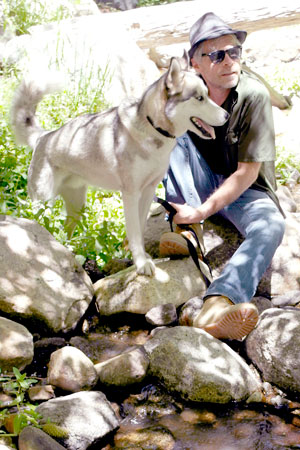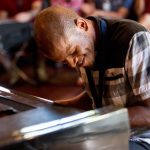
Photo courtesy Rick Barker
Philosopher Rick Barker, author of “Transcending Evolution, a Christian Guide to Understanding, Accepting and Transcending Evolution” (Amazon 2014), riffs on complex themes and evolutionary history much like a master jazz improviser. He connects the dissonances and sonorities of human societal growth to illustrate what is the most important end product of that growth — choice.
He is the featured presenter this month for the Idyllwild Community Center’s Speaker Series. He will examine the question, “Is War Inevitable?” by reviewing our continuing journey from tribal to global thinking and motivation. He notes that when we were more primitive, our drives were primarily alpha in nature — procreation and survival. But he points out we also had a drive, the empathy drive, that helped us integrate productive societal structures — division of labor, care for the young and elderly, self-sacrifice — that put the group before the individual. And that empathy drive has helped us balance our more primitive impulses, so that with awareness and recognition of our patterns we can overcome genetically wired predispositions to certain instinctive behaviors and be more at choice.
War, said Barker, is not the same as the aggressive nature of an individual. It was historically an empathetic impulse to protect the welfare of the group, the tribe. “It could be said that the most valuable thing about the empathy drive was that it made us more warlike,” said Barker. “The alpha drive alone put the individual’s needs before those of the group.”
But must that need to protect one group from another, to be warlike, continue as humanity evolves? How is it now, in the 21st century? How far have we evolved? And is war inevitable?
Barker notes that the easiest way to create solidarity is to create an “out” group — the “other.” “That’s what Hitler did,” said Barker. “He rallied a country by creating and demonizing an ‘out’ group.” But, Barker notes, we have grown to a point where, for the most part, we do not any longer create “out” groups based on genetically acquired traits. “That was the upshot of the 1960s,” he said. “It became explicitly illegal to judge or discriminate against others based on genetically acquired traits. We have gradually come to value culturally acquired traits over genetically defined ones such as race or skin color.”
He quotes Joseph Campbell, “Today the planet is the only proper ‘in’ group,” as an indicator of what is happening globally. “Our ‘in’ group will naturally expand over time,” said Barker. “It is my personal belief that the biggest challenges facing us today — including war, GMOs, climate change and factory farming — will not be solved from the top down. They can only be solved from a grassroots level. If we are ever going to get past being warlike, it will be because individual humans chose to be more connected and empathetic.”
Barker said much of reality is a mystery to him but what he does understand, from both a philosophical and scientific level, is human nature, why it is the way it is and how it can be changed by the individual, to increase his well-being and that of the world itself. “I subscribe to the notion that meaningful change can only happen in the world when a certain critical mass of people choose to be the change that they want to see,” he said. “I cannot change another person, only they can do that, but I can share a few tools that can help people change, help them be aware of choices they can make.”
Barker is a spirited and charismatic speaker. Although his body is dealing with the effects of Parkinson’s disease — he sometimes must consciously will his body to do things like walking that others take for granted — his intelligence and ability to convey an engaging and understandable narrative of the most complex issues remain powerful. “Parkinson’s turned out to be the luckiest thing ever,” said Barker, acknowledging how it caused him to reconsider existing patterns and make different choices.
His presentation is scheduled for 6 p.m. Thursday, Jan. 15, in the great room of Silver Pines Lodge. There will be a wine and cheese reception at 5:30 p.m. Both are free to the public.










